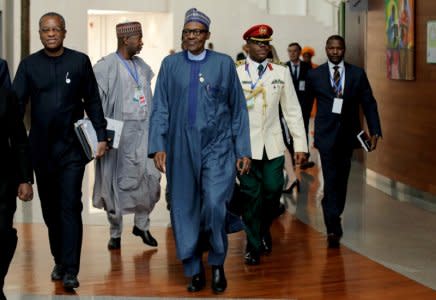Nigeria's president calls mass schoolgirl abduction 'national disaster'

Thomson Reuters
ABUJA (Reuters) - Nigerian President Muhammadu Buhari on Friday called the abduction of scores of girls from a school in the northeast by the Islamist militant group Boko Haram a national disaster, and said he was sending more troops and reconnaissance aircraft to look for them.
There is confusion over the number missing after Monday's attack, with estimates ranging from around 50 to more than 100. A roll-call at the girls' school in the village of Dapchi, Yobe state, on Tuesday showed 91 students were absent.
The kidnapping may be one of the largest since Boko Haram abducted more than 270 schoolgirls from the northeastern town of Chibok in 2014. Many of those girls are still being held, though others have escaped or been freed for ransom.
"This is a national disaster. We are sorry that this could have happened and share your pain," Buhari said in a statement directed to the parents of the missing girls.
Earlier in the week he sent more security forces and a ministerial team to the area.
Boko Haram, whose name roughly translates as "Western education is forbidden" in the Hausa language, is trying to create a state adhering to a strict interpretation of Islamic law.
The United Nations Children's Fund (UNICEF) said the tragedy of the Chibok girls' abduction had not been forgotten and described the latest kidnapping as a "new horror".
It said more than 2,295 teachers hade been killed and almost 1,400 schools destroyed since the jihadist insurgency began in 2009.
(Reporting by Stephanie Ulmer-Nebehay in Geneva and Felix Onuah in Abuja; Writing by Alexis Akwagyiram and Chijioke Ohuocha; Editing by Kevin Liffey)
See Also:

 Yahoo News
Yahoo News 
